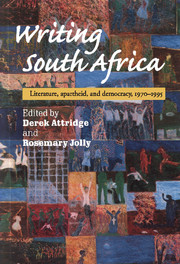Book contents
- Frontmatter
- Contents
- Contributors
- Acknowledgements and note on references
- South Africa, 1930–1996: a chronology
- Maps
- 1 Introduction
- 2 Interrogating silence: new possibilities faced by South African literature
- 3 I am dead: you cannot read: André Brink's On the Contrary
- 4 Endings and new beginning: South African fiction in transition
- 5 The post-apartheid sublime: rediscovering the extraordinary
- 6 Postmodernism and black writing in South Africa
- 7 Shame and identity: the case of the coloured in South Africa
- 8 A man's world: South African gay writing and the State of Emergency
- 9 The final safari: on nature, myth, and the literature of the Emergency
- 10 Interview
- 11 Speech and silence in the fictions of J.M.Coetzee
- 12 ‘Dialogue’ and ‘fulfilment’ in J.M. Coetzee's Age of Iron
- 13 Interview
- 14 Inside out: Jeremy Cronin's lyrical politics
- 15 Spinning out the present: narrative, gender, and the politics of South African theatre
- 16 South African theatre in the United States: the allure of the familiar and of the exotic
- Position papers
- 17 Preparing ourselves for freedom
- 18 Challenges facing theatre practitioners in the new South Africa
- 19 Current trends in Theatre for Development in South Africa
- Select bibliography: South African literary writing in English, 1970–1995
- Index
17 - Preparing ourselves for freedom
Published online by Cambridge University Press: 05 July 2011
- Frontmatter
- Contents
- Contributors
- Acknowledgements and note on references
- South Africa, 1930–1996: a chronology
- Maps
- 1 Introduction
- 2 Interrogating silence: new possibilities faced by South African literature
- 3 I am dead: you cannot read: André Brink's On the Contrary
- 4 Endings and new beginning: South African fiction in transition
- 5 The post-apartheid sublime: rediscovering the extraordinary
- 6 Postmodernism and black writing in South Africa
- 7 Shame and identity: the case of the coloured in South Africa
- 8 A man's world: South African gay writing and the State of Emergency
- 9 The final safari: on nature, myth, and the literature of the Emergency
- 10 Interview
- 11 Speech and silence in the fictions of J.M.Coetzee
- 12 ‘Dialogue’ and ‘fulfilment’ in J.M. Coetzee's Age of Iron
- 13 Interview
- 14 Inside out: Jeremy Cronin's lyrical politics
- 15 Spinning out the present: narrative, gender, and the politics of South African theatre
- 16 South African theatre in the United States: the allure of the familiar and of the exotic
- Position papers
- 17 Preparing ourselves for freedom
- 18 Challenges facing theatre practitioners in the new South Africa
- 19 Current trends in Theatre for Development in South Africa
- Select bibliography: South African literary writing in English, 1970–1995
- Index
Summary
Paper prepared for an ANC in-house seminar on culture [in 1989]
We all know where South Africa is, but we do not yet know what it is. Ours is the privileged generation that will make that discovery, if the apertures in our eyes are wide enough. The problem is whether we have sufficient cultural imagination to grasp the rich texture of the free and united South Africa that we have done so much to bring about.
For decades now we have possessed a political programme for the future – the Freedom Charter. More recently the National Executive of the ANC has issued a set of Constitutional Guidelines which has laid down a basic constitutional approach to a united South Africa with a free and equal citizenry. What we have to ask ourselves now is whether we have an artistic and cultural vision that corresponds to this current phase in which a new South African nation is emerging. Can we say that we have begun to grasp the full dimensions of the new country and new people that is struggling to give birth to itself, or are we still trapped in the multiple ghettoes of the apartheid imagination?
For the sake of livening the debate on these questions, this paper will make a number of controversial observations.
The first proposition I make, and I do so fully aware of the fact that we are totally against censorship and for free speech, is that our members should be banned from saying that culture is a weapon of struggle.
- Type
- Chapter
- Information
- Writing South AfricaLiterature, Apartheid, and Democracy, 1970–1995, pp. 239 - 248Publisher: Cambridge University PressPrint publication year: 1998
- 11
- Cited by



